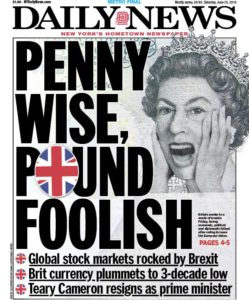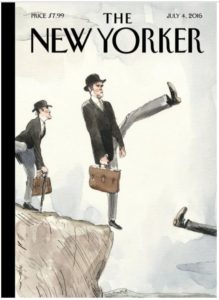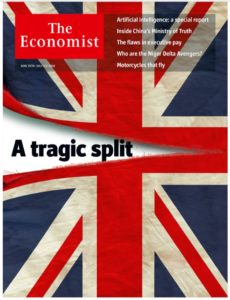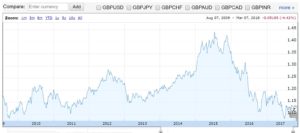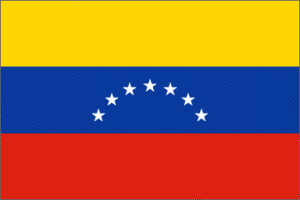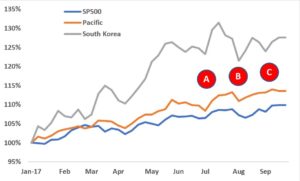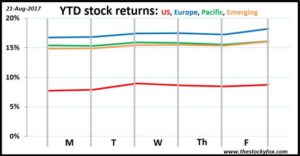Kim Wang and Foxy Lady worked together at VF after he and his family moved to Greensboro from Shanghai. He and his family are awesome. They have a 6-year-old daughter (Lil’ Fox’s age) and a 3-year-old son (Mini Fox’s age), so our families really mesh well together.
Kim was nice enough to sit down with me to discuss how investing happens in China. So without further ado, here is the International Perspectives—China edition:
Stocky Fox: Kim, thank you so much for taking the time to tell us how investing works in China.
Kim Wang: My pleasure. I enjoy reading your blog, and it always makes me think about how similar some things are in China and how different other things are. Bear in mind, as we chat, China has a lot of people with different perspectives. My experience is probably fairly representative of a middle-class Chinese person from a large city like Shanghai, but there are always going to be differences.
SF: Absolutely. Good reminder. Now, let’s get started. I think a lot of Americans think of China as a communist country where private companies and stocks and investing don’t really happen. How does it really work?
KW: Today, investing for middle-class Chinese are very similar to what you describe in your blog. However, that has been a huge change over the last 50 or so years. China has had an amazing transformation from the image you described which was fairly accurate when my parents were young, but today, we look a lot like America.
SF: How was it like for your parent’s generation?
KW: When my parents first got married, they were each making about 65 yuan per month (about $10).
SF: That seems really low. How did they get by?
KW: You’re right, that is very low. But you have to remember that was when the entire economy was socialized and run by the government. They worked in factories, but then their healthcare, pension, and everything else was all provided for the government, and the cost of food and house rental is low so they really didn’t have to buy a whole lot.
SF: So what did they do with that money?
KW: They saved a lot of it. Back then, the savings rate was really high, like 50%.
SF: Wow, that really is high. How did they invest it.
KW: Back then they weren’t too sophisticated, so it was usually just buying CDs through the bank. The other thing a lot of people did was buy gold bars or gold jewelry, and then they’d keep it in their house.
SF: But then you said things have changed now?
KW: Yes, by the time I was in college [about 15 years ago] the economy had liberalized a ton. The government was providing less, but people were making more, so it started to look a lot more like the US.
SF: What does investing look like in China now? Let’s start by asking how people learn what they should do, what types of investments they should make.
KW: Investing has actually become a bit of a cultural phenomenon which I think is a bit like in the US. There are some books like Rich Dad, Poor Dad that were extremely popular. That talks a lot about savings and how to invest, covering a lot of topics that you address in your column—how much to save, what types of mutual funds to buy, how to find the lowest fees, etc.
SF: So walk me through how a middle-class Chinese person like you would invest? Do you go online and open up an account at the Chinese version of Vanguard, or something like that?
KW: Funny thing is that that first step is very different in China. Culturally, our relationships with our parents are a bit different. Most younger Chinese people give their savings to their parents, and then it’s up to the parents to do the investing for the kids. So in that way the parents are making most of the investing decisions.
SF: OK. So how would mom and dad do it.
KW: Like I said, they learn their basic investment philosophy from books, and also from talking to each other. Moms talk to other moms and dads talk to other dads about the best investments to make. Then most people do their investments at their local bank. The commercial bank where you have your checking account also offers brokerage services where you can buy stocks and mutual funds.
SF: So that’s a bit different in the US. Here those tend to be separate.
KW: Yeah, so you just go to your local bank. However, because there tends to be a bit of a suspicion about these things, it’s very common for people to set up accounts at several banks just because people are afraid a bank might go under or rip you off. So it’s common to invest in very similar mutual funds, let’s say the 500 largest Chinese companies, similar to your S&P 500, but have those similar mutual funds held by several different banks.
SF: I know in the 1930s there were a lot of problems in the US with bank runs and banks failing. Is something like that what causes people in China to do that?
KW: I can’t really point to anything specific like that, but in general the Chinese culture has a suspicious eye to things where “giving” your money to someone else is involved.
SF: Got it. So you’re parents do a lot of your investing. Which funds to they pick?
KW: Similar to the US, broad mutual funds of Chinese companies are popular. However, there is a lot of marketing that goes on in China, more than in the US. salesperson from the bank are constantly talking to you about their mutual funds. Sometimes it seems a bit shady, like a lot of those American movies where people are trying to “unload” bad investments on people. In reality I don’t think it’s that bad, but it doesn’t seem like the right way to do it.
SF: Do stuff like that lead to a lot of fraud?
KW: Not really. There are scandals in China just like the US, but I think that happens everywhere. But I think a major problem is that people like my parents’ generation, who probably aren’t the savviest investors, probably don’t always make the best investment decisions. They are probably swayed more by these telemarketers than they should be.
SF: That certainly happens a lot in the US, people falling prey to less-than-scrupulous investment sales people. So it sounds like China has really come a long way in investing.
KW: Definitely. Actually, in some ways I think we’ve even passed the US. Now it’s very common to have investing accounts set up on your phone via Alipay or Wechat Pay. You can invest any time you want, and for as little as 1 yuan [about $0.15]. There’s some good things to that and maybe some not so good. But it’s definitely advancing.
SF: You said earlier that your parents’ generation was saving something like 50%. That’s much, much higher than in the US. Given that China’s economy has started to look at lot more the US, are people from your generation able to save that much?
KW: No, not even close. I think people from my generation save about 25% which is still fairly high, but then young people today in their 20s are probably saving 5% or so.
SF: That’s a similar number to US people that age. Given that Chinese people are making a lot more money what are they doing with it?
KW: Real estate is rooted in Chinese culture and that makes it a big investment, especially in the bigger cities. It’s common for three generations of a family to all pool their money and buy an apartment. Actually, it’s a bit of a necessity, especially if the family had boys.
SF: What do you mean?
KW: Culturally, a man needs to own a house in order for a woman’s family to agree to them marrying. So in that way, if a family wants to have their kids “grow up” they need to save a lot of their money to buy an apartment or house.
SF: That doesn’t really seem like an investment as much as a purchase.
KW: That’s true to some degree, but over the past 10 or so years, real estate prices have gone through the roof, especially in the top-tier cities like Beijing and Shanghai. Prices in Shanghai have risen about 30% each year for the past 5 or so year. So it definitely becomes an investment.
SF: What are some other things the young people are doing with their money?
KW: There’s a huge push in China among the younger people to self-improvement as an investment. So people spend money at the gym and at night school and things like that.
SF: Again, is that really an investment?
KW: Definitely. Take the gym for instance. Jobs are so competitive in China right now and people have to work such long hours. Many people look at the limited free time they have, and want to improve their health so they can continue to work at that pace. They will spend money on trainers and things like that to make sure they are getting the maximum benefit of the limited time they have.
SF: OK, I can see where that makes sense.
KW: Also, a lot of people take self-improvement courses. It’s very common for someone who has finished college and got a degree to take classes at night to improve their English or to learn computer programming or something similar. Those are very much investments in themselves, and I think people very much think of it that way. I can invest so much money and it will have a return, or I can spend it to improve my skills and that will have a return. Which one will benefit me more?
SF: It really does sound like China is very similar to the US when it comes to investing and personal spending. Certainly, it’s much closer than I would have ever thought.
KW: Yeah, in the past 50 years I think we’ve closed the gap with the US in this regard.
SF: I want to thank you so much for sharing this perspective with me and our readers.

